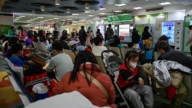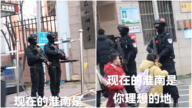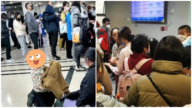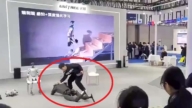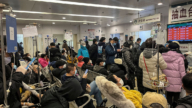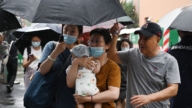【新唐人2012年10月15日讯】10月12号,山西省太原市阳曲县郑家寨村一名90岁高龄老人尹玉林去世。这位老人抱憾而终,因为日本侵华期间她被日军抓去充当慰安妇,1992年开始,她和其他十五名受害女性站出来起诉日本政府,指控日军禽兽罪行。但是日本法院宣判不予赔偿。中共政府对自己的国民讨还公道的努力始终袖手旁观。
1942年春天,日本官兵闯入山西盂县尹玉林家,把她和姐姐一同抓走。日军对姐妹二人进行了轮奸。打那之后,日军时常把姐妹二人和其他被抓来的妇女用刺刀指着,威逼到炮楼,这样持续了一年多的时间。
被称为“中国民间慰安妇调查第一人”的张双兵告诉《新唐人》,他调查了中国100多位慰安妇。而从1992年开始,十几年时间先后有三批16位女性受害者,到日本向法院起诉日本政府。前后经历了三级法院审理,到2007年的时候宣判。
山西省教师 张双兵:“但是最终日本法庭的判决,承认(慰安妇)这是事实,但是不予赔偿。这种判决我们认为不是不当判决,而是一种野蛮判决。说服不了受害者和家属,也说服不了受苦受难的人民。”
日本法院以时效已过,和个人不得起诉政府为由,判决不予赔偿。
张双兵:“关于时效问题,因为我们战后,中国和日本一直是冷战阶段,就没有建立外交关系,也就没有这个条件提出起诉。再一个,个人不得起诉国家政府这个理由,我们认为,因为是你日本政府下命令侵略中国,为什么你可以欺负人民,但是人民不允许起诉你日本政府?”
两个日本民间组织——“日本山西查明会”和“日本图片展委员会”给尹玉林发来唁电说:“ 大娘的心愿‘得到日本政府的正式谢罪和赔偿,争取恢复名誉’在生前未能实现,我们感到十分愧疚。”
而在尹玉林去世后,山西的慰安妇“活证人”仅剩下6位。
在慰安妇寻求日本政府赔偿问题上,中共政府始终保持沉默,更没有出面向日本政府提出交涉。“中国民间保钓联合会”成员冯景华说,他无法理解中共政府的做法。
保钓人士冯景华:“我们国家为什么不做这些事情,我们也很纳闷,我们也很郁闷,我们也希望国家有关部门把这个事情重视起来。但是因为受害者的牵扯面是非常广的。这个事情一旦提到桌面上来以后,像劳工问题,化学武器问题,慰安妇问题,那么有人可能就会认为破坏中日关系,破坏中日友好啦。”
冯景华说,他们保钓人士每年都会去探望这些老人,但是人数一年比一年少。在他们看来,中共政府和日本政府都希望这些人尽快走掉。大家都把这个当成一个包袱。尤其是中共政府。故意视而不见,看着他们这样默默死去。对他们的生活救济和医疗救济,完全没有。
冯景华:“我们在声讨日本人的时候,我们更应该反思我们中国人自己。为什么我们中国的受害者会生活的这么凄惨?为什么日本的加害者他们生活的那么好?我也见过日本兵,包括当年广岛原子弹的受害者,日本政府把他们照顾的很好。但是反过来我们中国呢?这些老人没有医疗保险,也没有其他保险。这也是我们中国社会现状导致的。”
相比之下,韩国政府10月1号在联合国大会主旨演讲中首次提出了慰安妇问题。 8月30号,韩国宪法裁判所对原慰安妇起诉政府的索赔请求案作出判决,认定政府在处理原慰安妇赔偿问题上,没有很认真的与日本政府交涉,违反宪法相关规定。随后,韩国政府要求日本政府就慰安妇的赔偿请求权问题,开展两国政府间的协议。
采访撰稿/秦雪 后制/葛雷
The comfort women witnesses died, prosecuting the Japanese
government with the Communists standing by
On Oct. 12th a 90-year-old woman Yin Yulin, from Zheng
jia Zhai, Yangqu County, Taiyuan city, Shanxi Province, died.
The old woman’s death was regrettable as she was arrested by the
Japanese army to act as comfort women during Japan invading China.
From 1992, she and other fifteen female victims come forward
to prosecute the Japanese government.
They accused the Japanese army of bestial crimes.
However, the Japanese court gave no compensation.
The Chinese Communist Party (CCP) stood by as its own
Citizens made efforts to pursue justice.
In the spring of 1942, the Japanese officers and soldiers broke
into Yin Yulin’s home in the Yu country, Shanxi provinces.
They arrested her and her sister together.
The two sisters were gang-raped by the Japanese soldiers.
The two sisters and other women who were caught were often
forced with bayonets to the towers to act as comfort women.
This lasted more than a year.
Known as “the first person of Chinese Folk comfort women
investigation” Zhang Shuangbing told NTDTV that he had surveyed more than 100 Chinese comfort women.
From 1992, in 10 years, there were three batches of 16 female
victims prosecuting the Japanese government in Japanese courts.
Through three courts, the case was sentenced in 2007.
Teacher in Shanxi Province, Zhang Shuangbing: “In the end,
the Japanese court’s decision admitted that the comfort women stories were true,
but offered no compensation. We didn’t think
it was a proper judgment, while being a barbaric judgment.
It not only can’t convince the victims and their families,
but also can’t convince the suffering people. ”
The Japanese courts pronounced no compensation
because statutory limitations had passed.
The individual weren’t allowed prosecuting the government.
Zhang Shuangbing: “On the statute of limitations-because
after the war, China and Japan were in a Cold War—
they did not set up diplomatic relations
so there are no conditions to prosecute.
Also, as private citizens can’t prosecute the government, we
think, since the Japanese government commanded the invasion of China,
why your government can bully people, but the people
are not allowed to prosecute Japanese government? “
Two Japanese non-governmental organizations, Japan Shanxi
Identify Committee and Japan Photo Exhibition Committee sent a telegram of condolences to Yin Yulin.
They said: “Aunt’s wish to get ‘the Japanese government’s
formal apology and compensation, to restore the reputation’
before her death failed to achieve this and we feel very guilty."
After Yin Yulin death, in Shanxi, only six comfort women
“living witnesses" remained.
While comfort women are seeking Japanese government
compensation, the CCP remained silent.
They didn’t make representations to the Japanese government.
The Chinese folk Diaoyu Islands Federation members Feng
Jinghua said he could not understand the practice of the CCP.
Diaoyu personage Feng Jinghua: “Why does China not do
these things? We are also very puzzled, we are very depressed.
We also hope that the relevant state departments
pay attention to this matter.
The victims are involved very widely, once it is mentioned
Along with such issues as labor, the chemical weapons issue,
the comfort women issue, then some people might think
that it will destroy Sino-Japanese relations and Sino-Japanese friendship."
Feng Jinghua said that every year, Diaoyu personage visit
the old people, but their number decreased every year.
In their view, the CCP and the Japanese government
hope these people to die as soon as possible.
They regard those people as a burden, especially the CCP.
They are blindly waiting, watching them silently die. They have
no living benefits such as pension and medical relief, either.
Feng jinghua: “When we denounced the Japanese,
we should reflect on our Chinese people ourselves.
Why have we Chinese victims lived so miserably?
Why have Japanese victimizer lived so well?
I also have seen the Japanese soldiers, including victims
of the Hiroshima bomb; the Japanese government took good care of them.
But how are our Chinese victims treated? These old people
have no health insurance, no other insurance.
This is the result of our current social situation in China."
By contrast, on Oct.1st, for the first time, the South Korean
government proposed the issue of comfort women in the keynote speech of the General Assembly of the U.N.
On Aug. 30th the Korean Constitutional Tribunal claimed
judgment on the issue of former comfort women prosecuting the government for compensation.
The judgment pronounced that the Government violated
relevant provisions of the Constitution and
no serious negotiations with the Japanese government
in dealing with the former comfort women.
Subsequently, the South Korean government asked
the Japanese government to carry out agreement
between the two governments on issues of
comfort women’s compensation.





